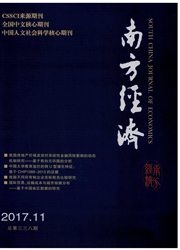

 中文摘要:
中文摘要:
为系统考察加工贸易对经济增长、环境污染的影响,本文依托中国30个省份2000—2009年的数据测算出考虑坏产出的Luenberger生产率指数,并在此基础上对加工贸易的环境全要素生产率效应展开深入分析。研究表明,加工贸易和环境全要素生产率之间存在着显著的倒U形关系,当加工贸易占货物贸易的比重超过0.35时,加工贸易将对中国环境全要素生产率产生负效应。与此同时,出口和进口在环境全要素生产率的决定中有着完全相反的作用。在以上结论的基础上,本文提出了调整外贸模式、完善产业政策、协调区域发展的若干政策建议。
 英文摘要:
英文摘要:
This article first attempt to examine the effect of China's processing trade on environmental total factor productivity. To better understand the processing trade how to impact economic growth and environmental pollution, we make use of 2000 - 2009 data of 30 provinces in China, estimates out Luenberger productivity index, and empirical analysis of the environmental total factor productivity effect of the processing trade. We found that, similar to the "environmental Kuznets curve" inverted U -shaped relationship between the processing trade and the environmental total factor productivity, which means that in the early days, engaged in processing trade can improve the environmental total factor productivity, once exceeds a critical value 0. 35, the processing trade will be harmful to the environmental total factor productivity. From the import and export channels, processing trade imports can contribute to the environmental total factor productivity, while processing trade exports detrimental to the environment total factor productivity. The inverted U - shaped relationship between the processing trade and the environmental total factor productivity means that processing trade is not a way to promote sustainable economic development, and this great warning significance for China to adjust foreign trade mode.
 同期刊论文项目
同期刊论文项目
 同项目期刊论文
同项目期刊论文
 期刊信息
期刊信息
